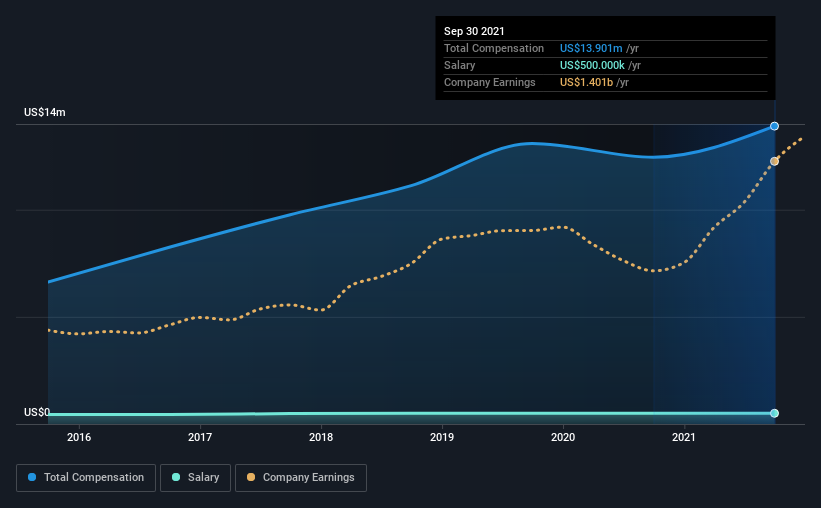- United States
- /
- Capital Markets
- /
- NYSE:RJF
We Take A Look At Why Raymond James Financial, Inc.'s (NYSE:RJF) CEO Has Earned Their Pay Packet

It would be hard to discount the role that CEO Paul Reilly has played in delivering the impressive results at Raymond James Financial, Inc. (NYSE:RJF) recently. Shareholders will have this at the front of their minds in the upcoming AGM on 24 February 2022. It is likely that the focus will be on company strategy going forward as shareholders hear from the board and cast their votes on resolutions such as executive remuneration and other matters. In light of the great performance, we discuss the case why we think CEO compensation is not excessive.
View our latest analysis for Raymond James Financial
How Does Total Compensation For Paul Reilly Compare With Other Companies In The Industry?
At the time of writing, our data shows that Raymond James Financial, Inc. has a market capitalization of US$23b, and reported total annual CEO compensation of US$14m for the year to September 2021. Notably, that's an increase of 12% over the year before. While this analysis focuses on total compensation, it's worth acknowledging that the salary portion is lower, valued at US$500k.
In comparison with other companies in the industry with market capitalizations over US$8.0b , the reported median total CEO compensation was US$12m. This suggests that Raymond James Financial remunerates its CEO largely in line with the industry average. Furthermore, Paul Reilly directly owns US$20m worth of shares in the company, implying that they are deeply invested in the company's success.
| Component | 2021 | 2020 | Proportion (2021) |
| Salary | US$500k | US$500k | 4% |
| Other | US$13m | US$12m | 96% |
| Total Compensation | US$14m | US$12m | 100% |
Talking in terms of the industry, salary represented approximately 16% of total compensation out of all the companies we analyzed, while other remuneration made up 84% of the pie. A high-salary is usually a no-brainer when it comes to attracting the best executives, but Raymond James Financial paid Paul Reilly a nominal salary to the CEO over the past 12 months, instead focusing on non-salary compensation. It's important to note that a slant towards non-salary compensation suggests that total pay is tied to the company's performance.

Raymond James Financial, Inc.'s Growth
Over the past three years, Raymond James Financial, Inc. has seen its earnings per share (EPS) grow by 18% per year. It achieved revenue growth of 30% over the last year.
This demonstrates that the company has been improving recently and is good news for the shareholders. Most shareholders would be pleased to see strong revenue growth combined with EPS growth. This combo suggests a fast growing business. Historical performance can sometimes be a good indicator on what's coming up next but if you want to peer into the company's future you might be interested in this free visualization of analyst forecasts.
Has Raymond James Financial, Inc. Been A Good Investment?
Boasting a total shareholder return of 107% over three years, Raymond James Financial, Inc. has done well by shareholders. So they may not be at all concerned if the CEO were to be paid more than is normal for companies around the same size.
In Summary...
Raymond James Financial prefers rewarding its CEO through non-salary benefits. Given the company's decent performance, the CEO remuneration policy might not be shareholders' central point of focus in the AGM. However, investors will get the chance to engage on key strategic initiatives and future growth opportunities for the company and set their longer-term expectations.
While it is important to pay attention to CEO remuneration, investors should also consider other elements of the business. That's why we did some digging and identified 1 warning sign for Raymond James Financial that investors should think about before committing capital to this stock.
Switching gears from Raymond James Financial, if you're hunting for a pristine balance sheet and premium returns, this free list of high return, low debt companies is a great place to look.
If you're looking to trade Raymond James Financial, open an account with the lowest-cost platform trusted by professionals, Interactive Brokers.
With clients in over 200 countries and territories, and access to 160 markets, IBKR lets you trade stocks, options, futures, forex, bonds and funds from a single integrated account.
Enjoy no hidden fees, no account minimums, and FX conversion rates as low as 0.03%, far better than what most brokers offer.
Sponsored ContentNew: AI Stock Screener & Alerts
Our new AI Stock Screener scans the market every day to uncover opportunities.
• Dividend Powerhouses (3%+ Yield)
• Undervalued Small Caps with Insider Buying
• High growth Tech and AI Companies
Or build your own from over 50 metrics.
Have feedback on this article? Concerned about the content? Get in touch with us directly. Alternatively, email editorial-team (at) simplywallst.com.
This article by Simply Wall St is general in nature. We provide commentary based on historical data and analyst forecasts only using an unbiased methodology and our articles are not intended to be financial advice. It does not constitute a recommendation to buy or sell any stock, and does not take account of your objectives, or your financial situation. We aim to bring you long-term focused analysis driven by fundamental data. Note that our analysis may not factor in the latest price-sensitive company announcements or qualitative material. Simply Wall St has no position in any stocks mentioned.
About NYSE:RJF
Raymond James Financial
A diversified financial services company, provides private client group, capital markets, asset management, banking, and other services to individuals, corporations, and municipalities in the United States, Canada, and Europe.
Solid track record with excellent balance sheet and pays a dividend.
Similar Companies
Market Insights
Community Narratives



